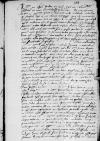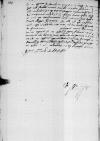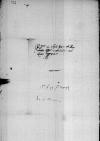Ex ⌊⌋ Dominationis Vestrae Reverendissimae, quas nuntius meus mihi reddidit, intellexi, quod forsan haec a me durius accepisset, quae de iuramento scripseram, verum oro, ne aegre Dominatio Vestra Reverendissima ferat, quod id, quod mihi insolens est et quod rarius fortassis, quam plerique alii fecerim, adeo difficile mihi visum fuerit. Cum autem hoc citra animae meae periculum fieri posse putat Dominatio Vestra Reverendissima, quod iam passim a primis orbis principibus usu receptum est, obsequentem me votis Dominationis Vestrae Reverendissimae praebebo. Quicquid illa praescripserit, cum tempus postulaverit, non gra[vate] me facturum suscipiam.
Has adiunctas Dominationi Vestrae Reverendissimae inscriptas a domino ⌊Ioanne a Werdenn⌋ heri accepi, litteras praeterea ad illum serenissimi ⌊Daniae regis electi⌋ cum schedis et aliis novitatum litteris, quas dominus ⌊a Werden⌋ repetit, eas itaque et illas, quas pridie a reverendissimo domino ⌊archiepiscopo Gneznensi⌋ habui, Dominatio Vestra Reverendissima mihi remittet, quam impense rogo consilium suum paternum mihi impartiat, quomodo in iis me gerere debeam, quae a me Dominatio eius Reverendissima desiderat.
Quid ⌊nobilitas nostra⌋ molitur ex litteris magnifici domini ⌊palatini Marienburgensis⌋ Dominatio Vestra Reverendissima videbit, cuius nisi ⌊serenissima maiestas regia⌋ temerarios conatus infringet, experietur una nobiscum, quantum incommodi huic ⌊rei publicae⌋ accrescet quantumque mali in se habeat factio etc.
Non possum celare Dominationem Vestram Reverendissimam, quod 1536-08-07⌊heri1536-08-07⌋ hinc a me abiit magnificus dominus ⌊palatinus Pomeraniae⌋, qui a domino ⌊Costka⌋ multis inductus precibus hoc messis tempore Sabbato praeterito tempore prandii huc applicuit. Summa totius rei fuit, ut reditum inter me et ⌊illum⌋ in gratiam faceret, cum satis demissa oratione ipsius domini ⌊Costka⌋, qua fatebatur neminem se ex medio nostri gravius, quam me offendisse, ut igitur prior ignoscerem ex Christiana pietate, quantum communi causae non officiat, a me obtinuit plurimumque rogavit, ut ad Dominationem Vestram Reverendissimam intercederem, quod huic schedae deprecatoriae, in qua pauca sunt immutata, re ipsa, quemadmodum ⌊serenissima maiestas regia⌋ praescripsit, manente integra Dominatio Vestra Reverendissima non velit adversari. In ea cum mihi videatur honori nostrum omnium satisfactum, ut aliquando huius dissidii finem habeamus, contenti esse possumus. Qua de re oranti pro hoste, quod ⌊Christus⌋ nos docuit,
Dominatio Vestra Reverendissima se facilem, quaeso, exhibeat. Si negotium hoc ad aulam nostram tandem devolvi deberet, cum illi indultum sit, quod toties regiam voluntatem et mandatum impune neglexerit, parum lucri, plus dispendi[i] et aeris et existimationis nostrae, ut nunc sunt tempora et rectrices illorum, faceremus. Quod illi est cum ⌊castellano Gdanensi⌋, ipsi viderint, modo nos ab ea lucta feriati, qui[e]te fruamur.
Fratrem meum ⌊Bernardum⌋ in horas apud Dominationem Vestram Reverendissimam spero futurum, quem postquam venerit, cum bona sua gratia et cumprimis ad me re[d]ire Dominatio Vestra Reverendissima permittat. Cui me summopere commend[o] eandemque Dominus Deus quam diutissime sospitet prosperetque in omnibus.


